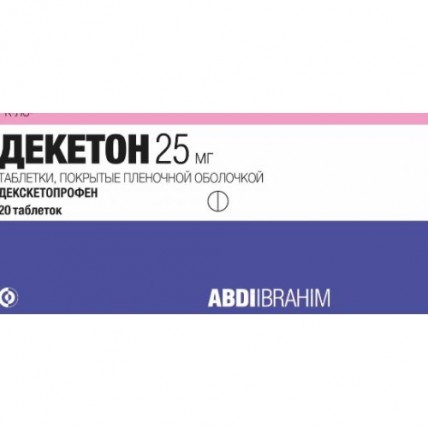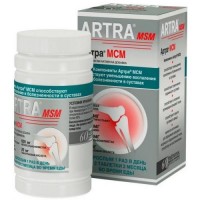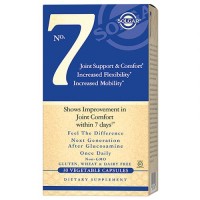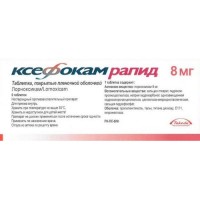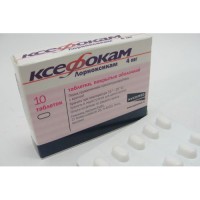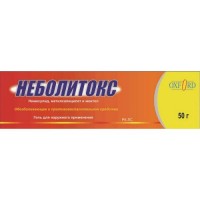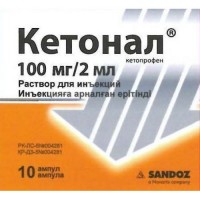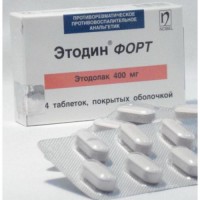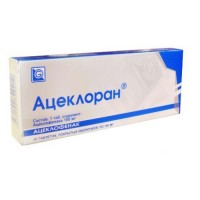Deketon 20s 25 mg film-coated tablets
- $5.00
The instruction for medical use of DEKETON medicine the Trade name Deketon Mezhdunarodnoye the unlicensed name Deksketoprofen Lekarstvennaya the Tablet form, film coated, 25 mg Structure One tablet contains active agent – a deksketoprofen trometamol 36.90 mg (it is equivalent to a deksketoprofen of 25 mg) excipients: cellulose microcrystalline (PH 101), starch corn, sodium of starch glikolit (type A), glyceryl distearate structure of a cover: Opadray II 85F18422 white * * polyvinyl alcohol, polyethyleneglycol 3350 powder, the titan dioxide (E 171), talc the Description of the Tablet of round shape, film coated white color, with the line of a break on both sides Pharmacotherapeutic group Anti-inflammatory and antirheumatic drugs. Non-steroidal anti-inflammatory drugs. Propionic acid derivatives. Deksketoprofen. The ATX M01AE17 code the Pharmacological Pharmacokinetics Later properties of oral administration of a deksketoprofen trometamol is reached by Cmax at the person on average in 30 minutes. Time of distribution is 0.35 hours and elimination half-life 1.65 hours. Linking with proteins of plasma - 99%. The average volume of distribution is less than 0.25 l/kg. The main part of drug is removed by kidneys in the form of metabolites (after a glyukuronirovaniye). Deketon's pharmacodynamics possesses anti-inflammatory, analgeziruyushchy and febrifugal action. The mechanism of effect of drug is based on oppression of synthesis of prostaglandins owing to cyclooxygenase suppression. After intake the analgeziruyushchy action of Rastel comes in 30 min. after administration of drug, duration of action is from 4 to 6 h. Indications the Pain syndrome of light and average intensity in the following diseases and states: - acute and chronic inflammatory diseases of the musculoskeletal system (pseudorheumatism, a spondylarthritis, arthrosis, osteochondrosis) - a dysmenorrhea - a toothache the Route of administration and doses Depending on a look and intensity of pain, the recommended single dose makes 1/2 tablets Deketon (12.5 mg) from 1 to 6 times a day with intervals between receptions of 4-6 hours or on 1 tablet (25 mg) from 1 to 3 times a day every 8 hours. The maximum daily dose makes 3 tablets of drug (75 mg). At patients with an abnormal liver function from easy to moderate severity or with slightly reduced function of kidneys, at elderly people the administration of drug should be begun in lower doses - no more than 2 tablets Deketon (50 mg) a day. In acute pains it is necessary to take a pill a minimum in 30 minutes prior to food. The drug Deketon is not intended for prolonged use: duration of reception should not exceed 3-5 days. Side effects Often (≥1/100 - & lt, 1/10) Sometimes (≥1/1000 - & lt, 1/100) it is rare (≥1/10000 - & lt, 1/1000) is very rare (less than 1/10000) Disturbances from blood and lymphatic system a neutropenia, Disturbance thrombocytopenia from the immune system a laryngeal edema anaphylactic reactions, including an acute anaphylaxis of Disturbance from a metabolism and food a loss of appetite Disturbance of mentality anemia insomnia Disturbance of nervous system headaches, dizziness, drowsiness the Parasthesia the Disturbance syncope from an organ of sight illegibility of sight of Disturbance from an organ of hearing and balance dizziness a ring in Disturbance ears from heart the Cardiopalmus tachycardia Disturbance of activity of a cardiovascular system hyperaemia hypertensia Disturbance hypotension from respiratory organs, a thorax and mediastinum bradipnoe a bronchospasm, dispnoe Disturbance from digestive tract nausea, vomiting, pains in the place of an injection, reaction in the place of an injection, including inflammation, a hematoma, bleeding gastritis, a constipation, dryness in a mouth, a meteorism stomach ulcer pancreatitis Disturbance from a liver and biliary tract hepatitis hepatocellular pathology Disturbance from skin and hypodermic fabrics pour dermatitis, an itching, rash, the increased sweating Stephens-Johnson's syndrome, a toxic epidermal necrolysis (Lyell's disease), a Quincke's disease, a face edema, the Disturbance photosensitization from skeletal and muscular and connective tissue of a dorsodynia of Disturbance from kidneys and urinary tract an acute renal failure, a polyuria nephrite or a nephrotic syndrome of Disturbance from genitals and a mammary gland dysfunction of a prostate, disturbance of a menstrual cycle the General disorders and disturbances fatigue, pain, an asthenia, spasms, an indisposition peripheral hypostasis are Most often observed side effects from digestive tract. So, development of a peptic ulcer, perforation or gastrointestinal bleeding, sometimes from the death, especially at elderly patients is possible. On the available data, against the background of use of drug the nausea, vomiting, diarrhea, a meteorism, a constipation, the dispeptic phenomena, an abdominal pain, a melena, a hematemesis, a stomacace, exacerbation of colitis and Crohn's disease can develop. Gastritis is less often observed. Hypostases, an arterial hypertension and heart failure are also noted. As well as in case of other NPVS, the following side effects are possible: aseptic meningitis which generally arises at patients with a system lupus erythematosus or the mixed diseases of connective tissue, and reaction from blood (purpura, hypoplastic and hemolytic anemia, seldom an agranulocytosis and a hypoplasia of marrow). Bullous reactions, including Stephens-Johnson's syndrome and a toxic epidermal necrolysis are possible (very seldom). According to results of clinical trials and epidemiological data, use of some NPVS, especially in high doses and for a long time, can be followed by some increase in risk of developing the pathology caused by thrombosis of arteries (for example, a myocardial infarction or a stroke). Contraindications - hypersensitivity to a deksketoprofen or other non-steroidal anti-inflammatory drugs - a peptic ulcer of a stomach and duodenum (including gastrointestinal bleedings and tendency to them) - active bleedings of various genesis, the increased bleeding - a concomitant use of anticoagulants - Crohn's disease, nonspecific ulcer colitis - bronchial asthma (including. in the anamnesis), recuring polyposes of a nose and near-nasal bosoms, intolerance of acetylsalicylic acid - heavy heart failure - a heavy renal failure (clearance of creatinine less than 30 ml/min.) - active diseases of a liver, a heavy abnormal liver function - the period after performing aortocoronary shunting - the confirmed hyperpotassemia - inflammatory bowel diseases - children's and teenage age up to 18 years - pregnancy and the period of a lactation Medicinal interactions: - with other NPVP, including salicylates in high doses (& gt, 3 g/days): increases risk of developing of gastrointestinal bleedings and ulcers, owing to synergism of action, - with anticoagulants: strengthens effect of anticoagulants (in case of need simultaneous use – careful control of laboratory indicators of blood), - with corticosteroids: increases risk of developing an ulcer and bleeding in a GIT, - with lithium drugs: increases concentration of lithium in blood plasma which can reach toxic level therefore lithium level in blood should be controlled during the assigning, change of a dose or cancellation of a deksketoprofen, - with a methotrexate: increase gematoligichesky toxicity of a methotrexate in connection with decrease in its renal clearance. It is necessary to carry out weekly control of a picture of blood in the first weeks of the combined treatment. In the presence even insignificant renal failures and also at elderly people the careful control is necessary, - with derivatives of hydantoin and streptocides: the expressiveness of their toxic manifestations can increase, - with diuretics, APF inhibitors, antagonists of receptors of angiotensin II and blockers of β-adrenoceptors: reduce efficiency of diuretic and other antihypertensive drugs, - with pentoksifilliny: increase risk of developing bleedings, active clinical monitoring and frequent control of a bleeding time is necessary, - with a zidovudine: in 1 week after the beginning of combination therapy the manifestation of toxic action of a zidovudine on reticulocytes which can lead to development of heavy anemia is possible. It is necessary to carry out calculation of blood cells and reticulocytes in 1–2 weeks from the beginning of the combined treatment, - with sulphonylurea drugs: increase in gipoglikemiziruyushchy action in connection with ability to force out them from places of linking with proteins of blood plasma, - with cyclosporine and takrolimusy: deksketoprofen can increase their nephrotoxicity. When performing combination therapy it is necessary to control function of kidneys, - with thrombolytic drugs: increase risk of developing bleedings, - antiagregantny means and selective serotonin reuptake inhibitors: increase risk of developing gastrointestinal bleeding, - with probenetsidy: concentration of a deksketoprofen in blood plasma can increase that can be caused by the inhibiting influence on canalicular secretion and/or conjugation with glucuronic acid that demands dose adjustment of a deksketoprofen, - with cardiac glycosides: increase their concentration in blood serum, - from hinolona: increase risk of developing spasms. Special instructions Should be careful when prescribing drug patients of advanced age, patients with allergic reactions, with general diseases of connective tissue and to patients with hemopoiesis disturbance. Administration of drug can mask symptoms of infectious diseases. In case of side effects and also in the absence of clinical effect within 3-5 days of treatment, it is necessary to report about it to the attending physician. Features of influence of medicine on ability to run the vehicle or potentially dangerous mechanisms As Deketon can cause decline in the ability to concentration of attention, it is necessary to appoint with care drug to the patients who are engaged in potentially dangerous types of activity requiring special attention and speed of psychomotor reactions. Overdose Symptoms: strengthening of side effects. Treatment: gastric lavage, prescribing of activated carbon, symptomatic therapy. The form of release and packing On 10 tablets place in blister strip packaging from an opaque film of PVH/PVDH and aluminum foil. On 1 or 2 blister strip packagings together with the instruction for medical use in the state and Russian languages place in a pack from cardboard Storage conditions to Store in the dry, protected from light place at a temperature not above 25 °C. To store out of children's reach! A period of storage 4 years not to apply after expiry date Prescription status According to the prescription ABDI IBRAHIM Istanbul Producer, Turkey the Owner of the registration certificate of "ABDI IBRAHIM" Istanbul, Turkey the Address of the organization accepting in the territory of the Republic of Kazakhstan claims from consumers on quality of products and responsible for post-registration observation of safety of medicine in the territory of the Republic of Kazakhstan Abdi Ibrahim Global Pharm LLP, the Republic of Kazakhstan, the Almaty Region, the Iliysky area, Industrial zone 282, ph.: +7 (727) 356-11-00, 8-800-070-1100
To develop
To develop
